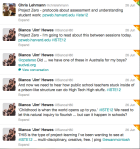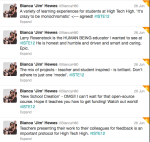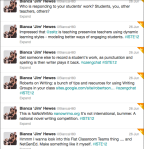“All writers are vain, selfish, and lazy, and at the very bottom of their motives there lies a mystery.”
The above quote is from George Orwell – one of my favourite writers – and comes at the end of his short essay titled ‘Why I Write’. This blog post (accidentally typed ‘essay’ first, lol) is both a homage to Orwell and a required activity. Why? Well, I’m going to be talking about blogging on a panel at the upcoming AATE conference in Sydney. I’m pretty nervous cos my co-panelists are two people who I hold in high-esteem: Darcy Moore who is the catalyst for my use of social media and this blog, and Kelli McGraw who has supported me and inspired me to always set high expectations for myself. I’m actually really anxious about this presentation – more so than the other two I’ve found myself involved in – because I received a list of questions from the lovely Melissa Kennedy who will be chairing the panel. The questions scare me – don’t get me wrong, they are amazing, important, interesting questions – but the most scary is, ‘Why do you bother with this blogging thing?’
This question got me thinking about Orwell’s argument that there are ‘four great motives for writing’. I guess falling back on great writers as a means to cheat and steal and answer to a tricky question has always been my style. So why stop now? Do I agree with Orwell’s motives? Um … stupid question, he’s Orwell. My philosophy lecturers always complained that I lacked a critical stance and too keenly accepted the ideas of others – guess I haven’t matured since I was 19, cos I’m very happy to accept Orwell’s four motives as being my own motives for ‘why I write’.
(i) Sheer egoism. Desire to seem clever, to be talked about, to be remembered after death, to get your own back on the grown-ups who snubbed you in childhood, etc., etc. It is humbug to pretend this is not a motive, and a strong one … Serious writers, I should say, are on the whole more vain and self-centered than journalists, though less interested in money.
This is such a great first motive. No one would write a public blog if they didn’t enjoy the attention (positive or negative) that it brings. Bloggers certainly aren’t interested in money, because you don’t get any (well, I don’t anyway so maybe someone who does can teach me how) and education bloggers are certainly not going to be getting any – in Australia at least. It’s true – I do like being talked about by other people – of course I’d prefer that it was my ideas and words, and not the clothes I wear. Education bloggers in Australia are few, and so it is pretty easy to get ‘known’ if you post regularly and the content of your posts are relevant to at least a small group of other people. Sometimes I’ll write a blog post just because I want someone to comment or tweet about it … if bloggers weren’t egotistical that we wouldn’t keep an eye on our stats.
(ii) Aesthetic enthusiasm. Perception of beauty in the external world, or, on the other hand, in words and their right arrangement … Desire to share an experience which one feels is valuable and ought not to be missed.
I have always loved to write and I have always dreamed of being a writer. Any type of writer would do. First I wanted to be a journalist, then it was a music journalist, a zine writer (I did this throughout my teen years before the Internet), a novelist, a confessional poet (but at 17 I didn’t have anything to confess), a philosopher (with no original thoughts this became too hard), a playwright (I even wrote a play and acted a small part in The Importance of Being Ernest) until finally I found blogging. It’s seems to have stuck. I find it easy to write here … intially I was scared shitless thinking thousands of people would read my words and laugh at me. Then I realised (thanks to the blog stats) that thousands won’t read my posts … 482 on one day is the most I’ve ever had.
Realising that my blog is my playground means I can write however I like. Mostly I write like this – honest, silly, personal. Sometimes I am angry and serious. sometimes emotional and irrational. I take great pleasure in constructing sentences, sometime carefully considering my purpose and sometimes typing in a great rush. I rarely, if ever mull over a post and very infrequently rewrite/edit a post. My writing is my thoughts. It is what it is. I post my travel adventures here too and if I ever felt like writing a story or a poem, I’d post them up too. Orwell is right … the impulse is a desire to share an experience, and that’s why this blog is a hodge-podge of posts … my life is a hodge-podge of experiences.
(iii) Historical impulse. Desire to see things as they are, to find out true facts and store them up for the use of posterity.
This is a very important impulse for an education blogger. It’s important – I think – that the real experiences of classroom teachers are being shared. Too often in this world of political agendas relating to education, or even worse the constant suggestion that there is a ‘reform’ to education coming or happening, means that we teachers are forgotten. Remembered publicly as numbers and words, forgotten privately as human beings and as professionals. Those statements are a bit big really … honestly my agenda is not that big. And anyway, politics is the next motive. Really, I want this blog to record my successes and failures as a teacher. I always say you can never ‘be’ a teacher, ‘you’re always ‘becoming’ a teacher … so this is a documenting of my ‘becoming’. It’s a process diary – a work in progress. An historical document of my attempt to be a better teacher and a desire to share that attempt with others who are similarly attempting to become better teachers too.
(iv) Political purpose. — Using the word ‘political’ in the widest possible sense. Desire to push the world in a certain direction, to alter other peoples’ idea of the kind of society that they should strive after.
Hmmm … I think I’m politically minded. Not very good with keeping track of polictical debates and can’t contribute intelligently to a political conversation … simply because numbers bore me. That doesn’t mean I’m not politically minded. Of course this blog has a political agenda insofar as I truly have a ‘desire to push the world in a certain direction, to alter other peoples’ idea of the kind of society that they should strive after’. My attitudes towards traditional schooling, my frustrations with limitations put on student expression and access, my disgust at the politicisation of education and my sincere interest in project-based learning and authentic learning experiences where young people are empowered by passionate teachers to change their shitty world. All of that is political. This blog always comes from the heart and with an intention to change or challenge current ineffective teaching practices … there’s a political motive in that, I reckon.








